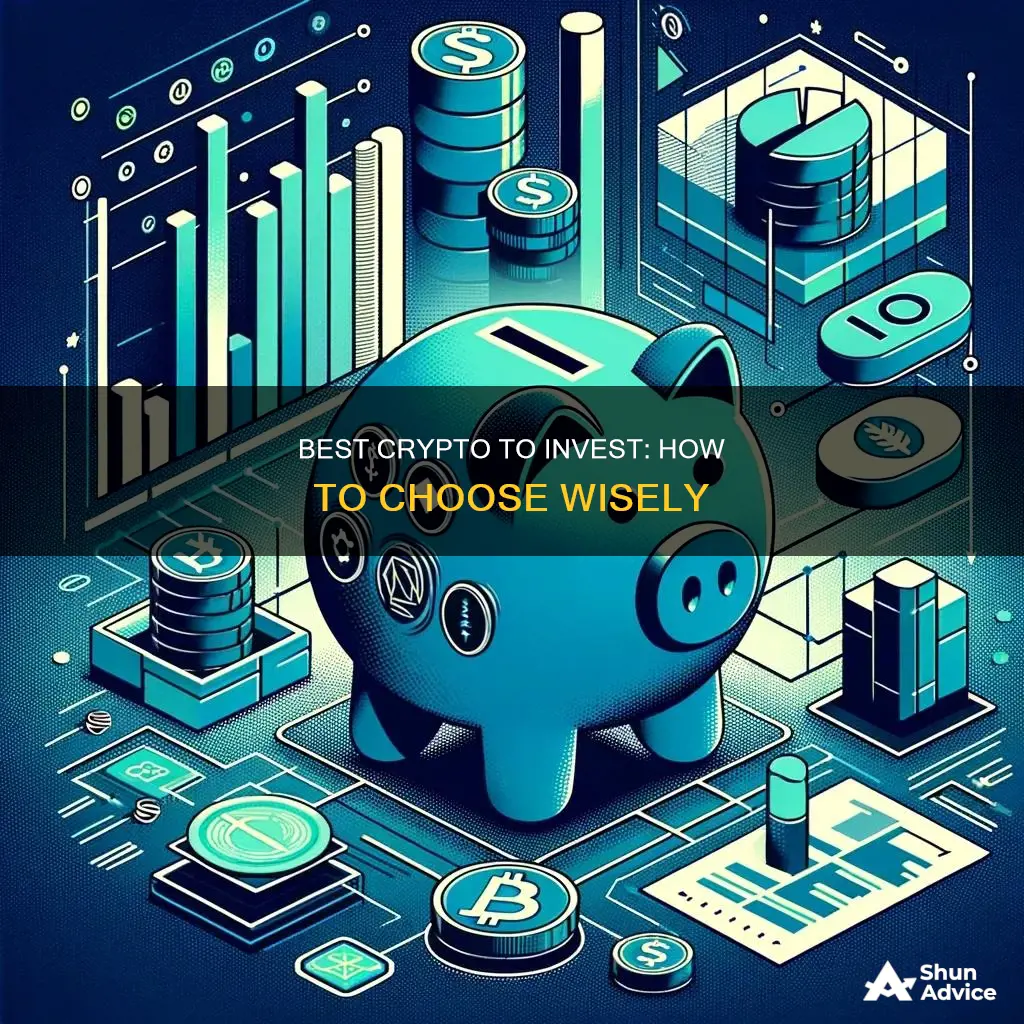
Cryptocurrency is a digital currency that is decentralised, meaning it is not issued, backed, or regulated by a central authority like a government. It is a volatile asset class, with large price swings, and there are many different types.
When determining the best cryptocurrency to invest in, it is important to do your research and understand the fundamentals. Look at the team behind the cryptocurrency, their track record, and their ambitions. Understand the underlying technology and how it compares to competitors. Read the white paper to evaluate the coin's fundamentals and look at the coin's credibility and reputation.
Other things to consider include the coin's following and community, its leadership and vision, and its price history and volatility. It is also essential to only invest what you can afford to lose and to diversify your portfolio to minimise risk.
| Characteristics | Values |
|---|---|
| Popularity | A large following and loyal supporters indicate people's interest and belief in the cryptocurrency. |
| Community | Active communities on platforms like Reddit, YouTube, and other social media platforms. |
| Fundamentals | Research the foundations of an investment: the team, their ambitions, their strengths, and their white paper. |
| Technology | Understand the underlying technology and how it performs against competitors. Look for big innovators that will disrupt the industry. |
| Leadership | Research the leadership team and their achievements. See if they are personally invested in the project and if they have relevant experience. |
| Credibility & Reputation | Is the cryptocurrency respected and trusted online? What are people saying about the coin in crypto communities? |
| Market Capitalization | Consider the exchanges where the token is listed. Tokens on major exchanges generally offer better liquidity and attract larger investors. |
| Purchase Availability | How easy is it to buy this currency? The easier a currency is to buy, the more likely it will benefit from hype or favorable news. |
| Wallet and Storage Options | Are there multiple solutions that work well for storing the currency? |
| Marketing | Check their Twitter account, other social media channels, and online influencers to see if they are promoting the currency. |
What You'll Learn

Research the fundamentals: white paper, team, technology, vision, and use cases
When deciding which cryptocurrency to invest in, it is important to research the fundamentals. This includes reviewing the white paper, analysing the team, understanding the technology, evaluating the vision, and considering the use cases. Here are some key points to consider:
White Paper
A white paper is a crucial document that outlines the technical and conceptual details of a cryptocurrency or blockchain-based project. It serves as a blueprint, providing insights into the project's vision, technology, and future roadmap. Before investing, take the time to read and understand the white paper, assessing whether the project has a strong foundation and a clear direction. Pay attention to the problem statement, technical details, implementation plan, and tokenomics. Be cautious if the white paper lacks detail, makes unrealistic promises, or contains spelling mistakes.
Team
Researching the team behind a cryptocurrency is essential due to their impact on the project's success. Evaluate the expertise and track record of key members, including developers and leaders. Assess their credibility, transparency, and relevant experience in the crypto industry. A strong team with a proven history of developing successful technologies can inspire more confidence in the project.
Technology
Understanding the underlying technology of a cryptocurrency is vital. Evaluate how the technology performs against competitors and identify any unique features or innovations. For example, consider Ethereum's smart contracts and Ethereum Virtual Machine technology, which have contributed to its success. Assess the technology's scalability, security, and ease of integration for developers.
Vision
Examine the cryptocurrency's vision and long-term goals. A project with a clear and ambitious vision, backed by a well-defined roadmap, is more likely to become a serious competitor in the industry. Evaluate the team's ability to execute their plans and navigate the project towards success.
Use Cases
Consider the use cases and potential benefits of the cryptocurrency. Evaluate whether the project addresses a genuine need or problem. For example, some cryptocurrencies aim to improve traditional payment systems by reducing fees, speeding up transactions, and enhancing accessibility. Assess the practicality and relevance of the use cases to determine their potential impact and adoption.
By thoroughly researching these fundamentals, you can make more informed investment decisions and identify cryptocurrencies with strong potential and solid foundations. Remember to always assess your risk tolerance and conduct your own due diligence before investing in any cryptocurrency.
Investing in Crypto: Who's in the Know?
You may want to see also

Assess the coin's community and followers
When determining the best cryptocurrency to invest in, it is important to assess the coin's community and followers. This can indicate how well the ideas and functions of the cryptocurrency are being accepted and how far it can spread.
To assess the community, you can look at their fan bases on Twitter, Facebook, Reddit, or Telegram to determine their size and how active they are on social media. Larger cryptocurrency communities usually have very active Reddit communities, but even the smaller communities are very helpful and usually happy to answer any questions.
You can also visit their social media accounts, including Twitter, Reddit, or Discord channels. Take note of the number of followers and the interaction in the comment sections. Assess whether the community moderators are answering questions, promoting news events, and actively participating in discussions. If people are posing legitimate questions and are being ignored or told they "just don't get it," that's a bad sign.
You can also do a general search across social media for mentions and discussions of the cryptocurrency. If a lot of people are talking positively about the cryptocurrency on social media, that can indicate there will be buying pressure and investment interest. On the other hand, if the mentions are mostly negative, that can be a warning sign.
Additionally, it is important to understand that cryptocurrencies with a much active community are destined for greatness.
Bitcoin Miners: A Smart Investment Strategy?
You may want to see also

Analyse the price, supply, and demand
When determining the best cryptocurrency to invest in, it is important to analyse the price, supply, and demand.
Price
The price of a cryptocurrency is determined by supply and demand. When demand increases and supply is limited or highly restricted, the price of that cryptocurrency goes up.
Cryptocurrency prices can be extremely volatile, with steep rises and unexpected dives. This is because the market is still relatively new and unstable.
Supply and Demand
Cryptocurrencies either have a limited or predetermined coin supply. The total supply is replenished only to account for lost units.
The demand for a cryptocurrency can be influenced by many factors, including its online presence and the influence of social media. Developers may coordinate with online outlets and social media influencers to generate hype around their cryptocurrency, causing more people to buy it and driving up the price.
Additionally, the relationship between supply and demand means that the price of a cryptocurrency can be manipulated to some extent. For example, a large holder of a particular cryptocurrency can create an artificial shortage by buying up all the available coins, causing the price to shoot up. They can then cash in on the gains by selling their coins, bringing the price back down.
It is also important to note that the entire cryptocurrency market tends to be very unpredictable and volatile. Even the biggest and most well-known cryptocurrencies can have big price swings. Therefore, it is crucial to consider the variety of cryptocurrencies in your portfolio and the total amount you invest in them.
A Beginner's Guide to Crypto Investing with Fidelity
You may want to see also

Consider the coin's credibility and reputation
When deciding which cryptocurrency to invest in, it is important to consider the credibility and reputation of the coin.
Firstly, you should research the team behind the cryptocurrency. Ask yourself if you trust in their expertise and whether they have a proven track record of success. For example, OmiseGo, which is part of the Omise group, has a strong team with a history of developing successful technology.
Secondly, look at the cryptocurrency's leadership team. These are the people who will carry out the cryptocurrency's vision and make the big decisions. Ask yourself if they are personally invested in the project and if they have a reputation as a CEO.
Thirdly, research the cryptocurrency's community and followers. A large and active community is a good sign as it shows that people have a genuine interest and belief in the cryptocurrency. You can find these communities on Reddit, YouTube, and other social media platforms.
Finally, consider the cryptocurrency's white paper, which outlines the purpose of the coin, its technology, how it works, and its overall vision. Be wary of unrealistic promises, overly ambitious objectives, and spelling mistakes, as these could indicate a lack of credibility.
By following these steps, you can assess the credibility and reputation of a cryptocurrency before investing.
The Ultimate Guide to Investing in Ethereum and Bitcoin
You may want to see also

Evaluate the exchange and storage options
When it comes to choosing the best cryptocurrency exchange, there are several factors to consider. Here are some detailed insights into evaluating the exchange and storage options:
Reputation and Security:
Prioritize exchanges with a solid reputation and robust security protocols. Look for exchanges that enforce strong encryption, two-factor authentication, and other security measures. Avoid exchanges with a history of security breaches or those that don't provide insurance for user funds.
Fees:
Various fees are associated with crypto exchanges, including trading fees (maker/taker fees), deposit fees, withdrawal fees, and account fees. Compare the fee structures of different exchanges, considering both the frequency and amount of your transactions. Some exchanges offer lower fees for high-volume traders or additional discounts when trading with their native tokens.
Supported Currencies:
Ensure that the exchange supports a wide range of cryptocurrencies and trading pairs that align with your investment goals. Some exchanges offer hundreds of coins, while others may focus on specific coins like Bitcoin or Ethereum.
Liquidity:
Choose an exchange with high liquidity, which means there are more active traders, resulting in faster order fulfillment. This is particularly important if you prioritize quick trades.
User Experience:
Opt for an exchange with a user-friendly interface that is intuitive and easy to navigate. This is crucial for both beginners and advanced traders to efficiently manage their trades.
Regulatory Compliance:
Select an exchange that complies with regulatory requirements, such as Know Your Customer (KYC) and Anti-Money Laundering (AML) rules. This indicates a level of transparency and helps protect users from fraudulent activities.
Storage Options:
When evaluating storage options, consider the level of security and accessibility you need. Here are some common storage options:
- Hot Wallets: These are connected to the internet and provided for free by many exchanges. While they offer quick access to your crypto, they are more susceptible to hacks and security breaches.
- Cold Wallets: Cold wallets are offline storage methods, such as hardware wallets or paper wallets. They are considered safer for storing large amounts of cryptocurrency, as they are not connected to the internet.
- Custodial Wallets: Some exchanges offer custodial wallets, where the exchange holds your private keys. While convenient, this option may raise security concerns, as exchanges are often targeted by hackers.
- Non-Custodial Wallets: With non-custodial wallets, you hold your private keys, giving you more control over your assets. This option may be preferable for those who prioritize security and privacy.
Ultimately, the choice of exchange and storage options depends on your specific needs and risk tolerance. It is recommended to research and compare multiple exchanges before making a decision.
Should Your Business Invest in Bitcoin?
You may want to see also
Frequently asked questions
Some pros of investing in cryptocurrency are the potential for high returns and the fact that it can be used to pay for purchases online without going through an intermediary like a bank. On the other hand, cons include the high energy usage associated with mining, evolving government regulations, the prevalence of scams and fraud, and the potential for significant financial losses due to the volatility of the crypto market.
It's important to do your research and understand the fundamentals of the cryptocurrency you're considering. Look into the team behind the currency, their track record, and their long-term vision. Analyze the white paper outlining the purpose, technology, and overall vision of the currency. Assess the credibility and reputation of the currency and its community. Additionally, consider the purchase availability, wallet and storage options, and the potential for real-world applications.
It's recommended to invest no more than 1-5% of your net worth in cryptocurrency. It's crucial to only invest what you can afford to lose, as the crypto market is highly volatile and subject to significant price swings. Diversifying your portfolio across multiple cryptocurrencies and taking a long-term perspective can help manage the risks associated with investing in this asset class.







